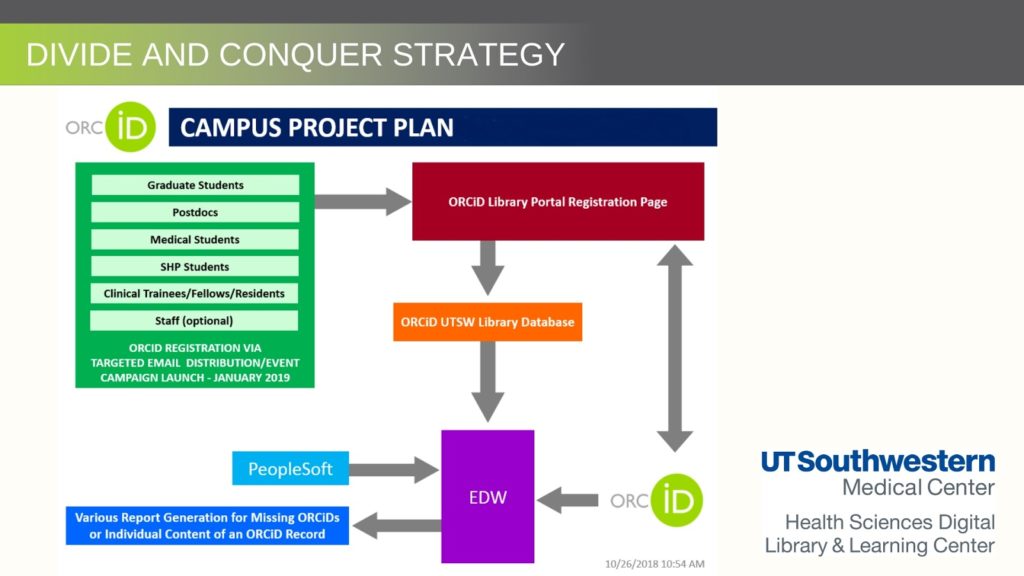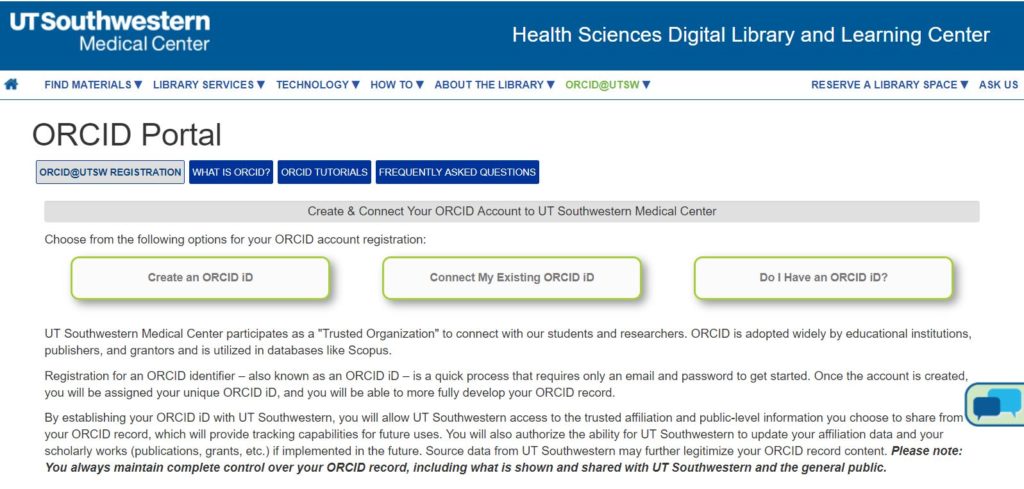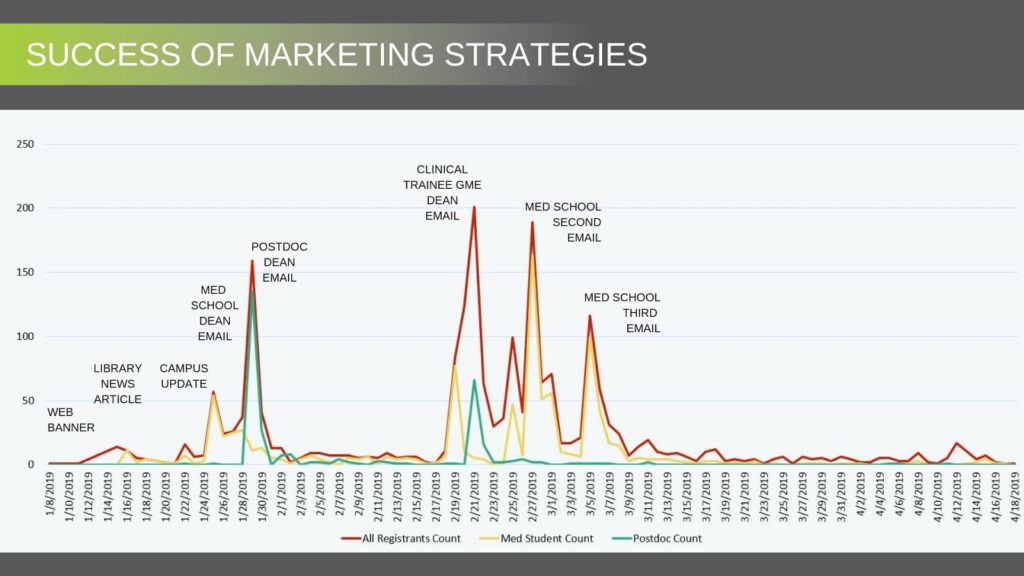
The University of Texas Southwestern Medical Center (UT Southwestern) became an ORCID member in the spring of 2018 in response to a prominent internal question: How can UT Southwestern become listed as a trusted institution on their affiliated researchers’ ORCID records? In an effort to streamline reporting and get a better idea of institutional impact, UT Southwestern has adopted ORCID as a mandate for all learners. The institution now has a live “Create and Connect” UT Southwestern ORCID Portal that works with their central data warehouse, and over 2,000 researchers have connected their ORCID iD with the UT Southwestern system within the first three months of launching. How was this done? Jane Scott, manager of the Digital Services and Technology Planning Unit at the UT Southwestern Health Sciences Digital Library and Learning Center, presented on their case study at the 3rd ORCID US Community Showcase webinar, summarized below.

Deans, VPs, and upper level administrators were key in pushing the ORCID initiative forward. Administrative units at UT Southwestern could see the potential for ORCID to help in relieving administrative burden, especially for accreditation and grant reporting. For example, the graduate school at UT Southwestern is funded largely by grants, and keeping track of graduate students 10-15 years after graduation to determine the impact of grant funding has been an arduous task. Using ORCID, graduate students can connect their ORCID iD with UT Southwestern, designating the institution as a trusted organization with permissions that last for 20 years by default. Then, when the students’ ORCID records are updated in the future, UT Southwestern can read new data using the ORCID API, rather than tracking down each individual. The persistent, long-term connection provided by ORCID was an important component that led to the decision to require ORCID iD connections for students, postdocs, and clinical trainees.
With the decision to adopt ORCID for learners institution-wide, one of the first steps was to ensure that all stakeholders had a shared understanding of the initiative and expectations around ORCID limitations and best practices. For example, with a focus on data integrity, manual entry of ORCID iD numbers into a system is not the best practice, rather, ORCID iDs should be authenticated using API connections between institutional systems and ORCID. The ORCID Member API also allows for secure, authenticated permissions for institutions to both read from and write to their affiliated researchers’ ORCID records, all of which can prove helpful for gathering reporting data. While ORCID offers a Public API, the ORCID Member API allows for institutional assertions and “trusted organization” status with affiliated researchers.
As with any collaborative project, expectations were clarified regarding what the project would entail, who would complete the work, how long it would take, and where it would fall in the priority queue. The UT Southwestern Library was identified as a key stakeholder that could bring added value to sustainability of the initiative and continuing library services around ORCID, especially as central IT was busy with other urgent priorities. A small team of developers in the library created the UT Southwestern ORCID Portal within 6 months. They were able to identify early on how ORCID data would flow through their data infrastructure at the campus level, including the role that each internal stakeholder unit would play in the process. Ultimately the decision was made to house the ORCID portal database on library servers to communicate with the campus Enterprise Data Warehouse (EDW).

The library took the lead in clarifying to other internal stakeholders that in order for ORCID to work as intended, individual researchers need to not only register for an ORCID iD, but also make sure their ORCID record continues to be populated with data, similar to updating a CV on a regular basis. The library identified training opportunities along the research cycle where they could promote and encourage ORCID use. Additionally, some aspects of researcher data that were important to UT Southwestern, like author order in citation listings, are not provided by ORCID, so plans were needed to mitigate these challenges. This required communication with staff across the campus in multiple units including the graduate school, the medical school, school of health professionals, the library, central IT, and the office of research.
For the user-facing workflow, all learners are encouraged to “Create & Connect” their ORCID iD through the libraries’ portal, which connects on the backend with the UT Southwestern data warehouse, LDAP, and central ID management system.

The UT Southwestern ORCID Portal explains what ORCID is and also links to FAQs and tutorials. Additional information about ORCID was made available online and sent out in library news articles, campus update emails, and handouts. Email templates were created for deans to send out, allowing each school to modify their introduction to the new ORCID requirements and include documentation on steps that need to be taken by students: register for an ORCID iD using the UT Southwestern ORCID Portal, and complete a mandatory online training module on ORCID account creation and future use.

As you can see from the graphic above, the strategy of having deans send ORCID emails directly to their constituents proved quite effective. Over time, they continued to send emails to people who had not registered yet, to encourage adoption.
Currently, staff at UT Southwestern are working to enable permanent strategies for encouraging ORCID iD registration and connections with the ORCID portal, focusing on creating an ORCID culture on campus. For example, ORCID iDs are now mandatory for submission to the Institutional Repository (IR), and the academic poster template that the library provides includes a spot for listing one or more ORCID iDs to reinforce the value of ORCID at the institution. Library staff are also including ORCID in courses that are taught, and they are encouraging inclusion of ORCID iDs in email signatures, CVs, and web pages for staff and faculty, as well as working on a future CV generator based on ORCID data. UT Southwestern is also considering the potential for faculty to use ORCID in Pure as well as the faculty profile system.
Many thanks to Jane Scott at UT Southwestern for sharing this case study; view the UT Southwestern webinar presentation here (12:06 – 36:10). For questions, please email orcidus@lyrasis.org.
